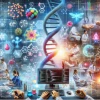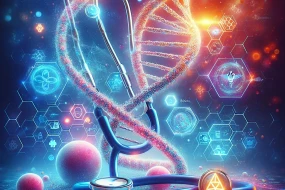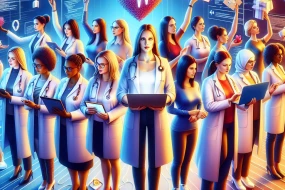
In an era where data is often dubbed the new oil, the healthcare sector finds itself at a transformative crossroads. The potential of data science to revolutionize patient care and streamline healthcare processes is immense. Yet, as with any powerful tool, the key lies in how it's wielded. This article explores practical ways data science can be leveraged to improve healthcare outcomes, drawing on real-world examples and offering insights into common pitfalls to avoid.
Understanding the Basics: What is Data Science in Healthcare?
At its core, data science in healthcare involves the use of algorithms, machine learning, and statistical models to analyze and interpret complex health data. This data can range from patient records and clinical trials to genetic sequences and beyond. The goal? To extract actionable insights that can lead to better decision-making, improved patient outcomes, and more efficient healthcare systems.
Predictive Analytics: Anticipating Patient Needs
Imagine a world where healthcare providers can predict a patient's risk of developing a chronic disease long before symptoms appear. This is the promise of predictive analytics, a branch of data science that uses historical data to forecast future outcomes. For instance, by analyzing patterns in electronic health records (EHRs), hospitals can identify patients at risk of readmission and intervene proactively. However, it's crucial to ensure that data privacy is maintained, and algorithms are free from bias, to avoid skewed predictions.
Personalized Medicine: Tailoring Treatment Plans
Data science enables the personalization of medicine, moving away from the one-size-fits-all approach. By analyzing genetic, environmental, and lifestyle factors, healthcare providers can tailor treatment plans to individual patients. This approach not only enhances the effectiveness of treatments but also minimizes adverse effects. A practical example is the use of pharmacogenomics, where genetic information is used to predict how a patient will respond to a particular drug.
Operational Efficiency: Streamlining Healthcare Processes
Hospitals and clinics are often bustling with activity, and managing such environments efficiently is no small feat. Data science can help optimize scheduling, reduce wait times, and allocate resources more effectively. For example, predictive models can forecast patient inflow, allowing hospitals to adjust staffing levels accordingly. However, one must be cautious of over-reliance on algorithms, as they should complement, not replace, human judgment.
Improving Diagnostics: Accuracy and Speed
One of the most exciting applications of data science in healthcare is in diagnostics. Machine learning algorithms can analyze medical images, such as X-rays and MRIs, with remarkable accuracy, often surpassing human capabilities. This not only speeds up diagnosis but also reduces the likelihood of human error. Nonetheless, it's vital to remember that these tools should assist healthcare professionals, not replace them.
Real-World Example: IBM Watson Health
IBM Watson Health has been a pioneer in applying data science to healthcare. By utilizing natural language processing and machine learning, Watson can analyze vast amounts of medical literature and patient data to provide evidence-based treatment recommendations. This assists doctors in making informed decisions, particularly in complex cases like cancer treatment.
Challenges and Ethical Considerations
While the benefits of data science in healthcare are undeniable, several challenges need addressing. Data privacy and security remain paramount, as breaches can have severe consequences. Additionally, ensuring that AI models are free from bias is critical to prevent disparities in healthcare delivery. Stakeholders must work together to create ethical guidelines that balance innovation with patient rights.
Common Mistakes to Avoid in Implementing Data Science
1) Over-reliance on technology without human oversight can lead to errors.
2) Ignoring data quality can result in misleading insights.
3) Failing to consider patient privacy and consent can lead to ethical breaches.
4) Not updating models regularly can make them obsolete.
5) Underestimating the importance of cross-disciplinary collaboration can hinder progress.
The Future: Continuous Learning and Adaptation
The landscape of data science in healthcare is ever-evolving. As technology advances, so too must our approaches to integrating it into healthcare. Continuous learning, adaptation, and collaboration among healthcare professionals, data scientists, and policymakers are essential to harness the full potential of data science in improving healthcare outcomes.































